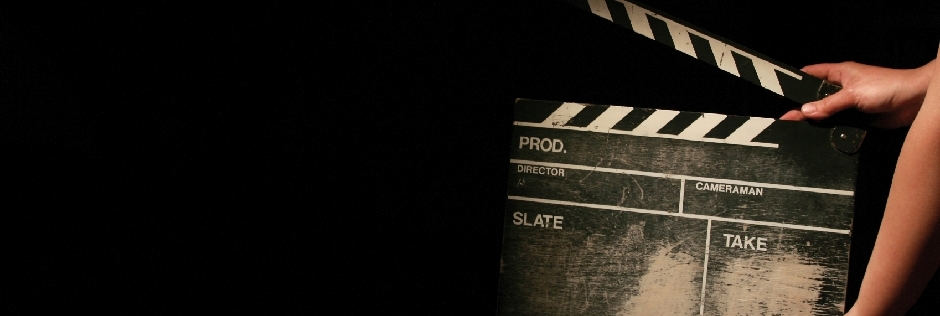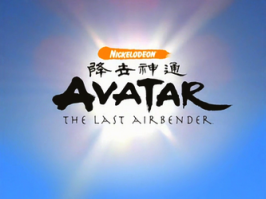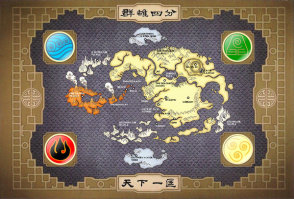
TAC Reviews...Avatar: The Last Airbender
Date Posted: 08/10/17
Produced by Nickelodeon Avatar The Last Airbender is an animated series that was first aired in 2005 and ran till 2008 with a total of Three Seasons. It received a big screen adaptation in 2010 courtesy of M Night Shyamalan, unfortunately this was yet another one of those films that marked the Sixth Sense’s director’s fall from grace, and was generally hated by fans of the series and filmgoers in general. For the purpose of this review it is the animated series I want to talk about.
Before I go any further I’ll address something, in the UK the word “bender” is a slang term meaning homosexual so when in the show people start exclaiming that “[someone] is a bender!” they are referring to their ability to manipulate the elements not their sexual preferences…so just so everyone gets the giggles out…bender, bender, bender, bender…[…still giggling…??…okay then…] bender, bender, bender, bender, bender, bender, bender, bender, bender, bender, bender…right, hopefully everyone has now got a straight face so we can now move on.
The premise of the show is that there are four nations, The Earth Kingdom, the Water Tribe, the Air Temples and finally the Fire Nation. The majority of the people living in these respective countries, or nations, have the ability to manipulate or “bend” the elements around them using variations on Chinese martial-arts techniques and stances but they are only capable of bending one of the four elements. In a recap message at the beginning of each episode we are informed that the four nations used to live in harmony together, until the Fire Nation attacked. The only one capable of stopping them was the Avatar, an individual that can control all four elements, but without warning the Avatar disappeared.
To give you an idea of the world, I have included this handy map…
One hundred years later, two young members of the Southern Water Tribe named Katara and Sokka discovered the newest Avatar Aang, a young boy of only twelve years old, frozen in a block of ice. They awaken him and discover that whilst he has mastered air bending, he hasn’t learned water, earth or fire bending.
If Aang is to stop the Fire Nation and their formidable Fire Lord, then he will have to master all four elements, and do it whilst trying to stay one step ahead of the Fire Nation as they relentlessly hunt him down…plus they have to contend the Fire Lord’s son Prince Zuko who has his own reasons to wanting to capture the Avatar.
I am a fan of animation and Avatar is an American-made anime. If you’ve ever seen an anime then you’ll know that the animation style itself can reflect how characters are behaving, for example when one of the characters is being more childish, their animation becomes more child-like reflecting what they are doing. There are also numerous sound effects that accompany someone behaving in a more childish way, but as the show never takes itself too seriously these effects just demonstrate that ultimately the three main leads are all children or young teenagers that have found the fate of the world suddenly in their hands.
The show is set around the era of feudal-Japan, and the Fire Nation is obviously inspired by the warlords of the twelfth to nineteenth century. The architecture also seems to fit this time period, however, the Southern and Northern Water Tribes are clearly modelled on the Inuit peoples. There are numerous types of religious inspiration from Hinduism to Buddist, and as I mentioned earlier the stances and moves used for the different types of bending (anyone still chuckling whenever I write that?) are modelled on Chinese martial arts techniques
Avatar has a sense of humour and not just down to Sokka, who is the main source of comic relief. Aang is a child and a lot of the time he asks like one. He gets into trouble because he doesn’t necessarily think things through. He, Sokka and Katara argue, and refuse to speak to one another. There are times when all of them act like children, because ultimately they are, so whilst Aang might be the Avatar he is also a twelve-year-old boy.
Fortunately the show does know when to take things seriously and when it does, it has to be said it doesn’t pull its punches.
Let me give you a quick history lesion on the Avatars…there have been hundreds of Avatars stretching back centuries and when one dies they are reincarnated in a particular cycle. Fire, Air, Water, and Earth. The reason that Aang is the Last Air-bender is because when his predecessor died, the new Fire Lord, knowing that the next Avatar in the chain would be an Air-bender hunted down and murdered all Air-benders in the hopes of stopping the new Avatar. If there is no one to learn from the Avatar can’t become master of all four elements and will be easier to kill. Aang only survived the slaughter because he was so overwhelmed at the responsibility that had now been placed on his shoulders by the monks in his Air-Temple that he fled into a storm. It was during that storm that he ended up crashing into the sea, where he became frozen for a hundred years until Katara and Sokka found him.
Aang can also go into something called “The Avatar State” at which time he draws on the power of all the Avatars that have come before him and becomes immensely powerful. It is insanely cool when he does this (especially in the finale of Season One) but in this state he is also at his most vulnerable. If an Avatar dies then another one is reincarnated in the cycle, however, if an Avatar dies whilst in the Avatar-State then they don’t get reincarnated and the Avatar will never return.
The show does deal with some dark themes, Aang ran away and as a result the war with the Fire Nation has been raging for a century, it is never stated how many have died but you’d assume tens of thousands in a war lasting a century. But realistically the real number could be hundreds of thousands or even millions, and the majority of characters in the series have lost someone at the hands of the Fire Nation.
The thing is that the soldiers of the Earth Kingdom are no saints either and we do see people in positions of authority bullying or stealing from the very people they are meant to be protecting.
The Fire Nation are presented as the military force hell-bent on conquering the world, but there are those that opposed the war. However, anyone that goes against the orders of the Fire Lord is swiftly and mercilessly dealt with.
As the series continues it is heavily implied that Fire Lord Ozai may have murdered his father to ascend to the throne. Zuko was horrifically burned by his own father for refusing to fight him in a duel, and was banished as punishment. It is also implied that Zuko was to be executed when Ozai attempted to replace his elder brother as successor to the throne, and was only saved when his mother took the punishment instead. The Fire Lord himself is kept in shadow for much of the series and is only seen late in the show’s run. They build him up massively, making him appear as almost a demigod, and you do wonder if even in the Avatar-State Aang is strong enough to beat him.
But therein lies a problem; Aang won’t kill (the other Avatars would if they needed to), so how can he stop someone who won’t stop fighting until they are dead??
Needless to say that the final two episodes are spectacular with the titanic battle between Avatar and Fire Lord being as epic as the build-up promised it would be.
The voice acting is superb with Mako as a particular highlight as Zuko’s quirky uncle Iroh who sees Zuko as a son (after he lost his own). He tries to be the father the young Prince never had and show him that there are other ways to occomplish his goals and tries to teach him to let go of his anger and bitterness of the past. Sadly Mako died mid-way through Season Two and was replaced. Iroh doesn't feature as heavily in the rest of Season Two as he did in the beginning, and his role is dramatically reduced in Season Three but he does still appear.
However, it is not all good and the show does suffer with what I’m going to call Americanitis. Basically the Americans don’t seem to do anything by halves, and so you get shows like Game of Thrones in which basically nothing happens week after week. Eventually something interesting does pop up but there has been a lot of nothing you’ve had to sit through before it does. Avatar has a similar problem but I will admit to a lesser extent. The episodes are around twenty-minutes long and there are twenty episodes to a season (there are three seasons in total), unfortunately there are a lot of “filler” episodes in which not a lot really happens. They are generally good enough as the on-screen characters are sufficiently entertaining to keep the audience from getting bored, however, the show would have still worked if there were maybe fifteen episodes a season rather than twenty.
Two of the best (or worst) examples of the show’s missteps are an episode called the Great Divide and an incident in an episode that I can’t recall the name of.
Basically in Divide two warring tribes must travel through a dangerous ravine together, during the episode both throw various accusations at one another. Katara and Sokka try to discover the source of the dispute, which apparently started around a century ago. One group think the other stole a sacred orb, whilst the other thinks that their man was unjustly imprisoned…at the end of the episode Aang explains that he knew both individuals and the despite was actually regarding a simple child’s game so continuing the despite is pointless. The two groups finally put their differences aside and let go of the grudge, and that is when Aang tells Katara and Sokka that he made up the story. Yeah, he didn’t know them and just lied. For a show that is pretty good at teaching values about honesty, loyalty, friendship and so on, this is a massive curve ball and even the show later acknowledges how stupid the ending to this episode was.
The other big misstep happens because Katara and Sokka’s father left the Southern Water Tribe to fight in the war and they haven’t seen him since. As they are travelling to the North Pole to find the Northern Water Tribe so Aang and Katara can learn water-bending (oh yeah Katara is a water-bender) they come across a man that was in their father’s group. He was injured and had to be left behind, but he is awaiting a messenger to tell him where their father has gone so he can catch up. This will naturally allow Katara and Sokka to go with him and see their father for the first time in years. Thing is the messenger gives Aang the map and he screws it up, then hides it from the other two. Again this seems really out of character for him. Yes, I get that he did it because he was afraid they’d abandon him to find their father but seriously, hiding the map?? What a nasty thing to do. Aang’s parents are never mentioned as he was raised at an Air-Bending Temple but surely no decent person could live with themselves for doing something so unpleasant. Okay, he does give the map to them, and they get angry, go to find their father, decide that helping Aang is more important, return to him, blah, blah, blah but they could have remained by his side if he’d given them the map in the first place. It is rather an awkward moment and kind-of leaves you feeling a bit uncomfortable that Aang would do such a thing to the only family he really has.
Thankfully the missteps are pretty few and far between, overall the show is great fun, has great characters, knows when to be serious and when to have some fun. Giving the show a Thumbs Up is a no-brainer really, and I would advise any fan of animation to check it out.
9/10- This is a great show and well worth tracking down. The film that tried to do it justice isn’t worthy to like the show’s boots. If you like animation as well as great stories, characters, humour and drama then give it a watch, if you don’t like those things, then…I dunno crawl back to the rock you live under I guess.





